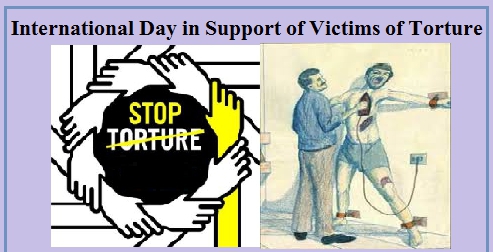TORTURE SEEKS TO ANNIHILATE THE VICTIM’S PERSONALITY- UN SEC GEN
Oru Leonard
The UN Secretary General António Guterres had said that torture seeks to annihilate the victim’s personality and denies the inherent dignity of the human being.
Guterres stated this in his message to mark the International Day in Support of Victims of Torture,
He noted that despite the absolute prohibition of torture under international law, torture persist in all regions of the world.
“Concerns about protecting national security and borders are increasingly used to allow torture and other forms of cruel, degrading and inhuman treatment. Its pervasive consequences often go beyond the isolated act on an individual; and can be transmitted through generations and lead to cycles of violence”, he added.
In his remarks the UNODC Representative in Nigeria, Dr Oliver Stolpe said the International Day serves as an opportunity for governments, civil society organizations, human rights advocates and torture victims around the World to educate the public on the issue of torture, to celebrate the steps made towards ending its use, and to mobilize the political will to stamp out this crime, which, wherever it happens, is recognized as being the concern of all of humanity.
“Human rights abuse is a major driver of conflict in general, and terrorism in particular. Misguided notions that the use of torture can somehow deter criminals or defeat terrorism simply set up future outbreaks of violence. This is not simply a case of two wrongs not making a right, but rather of two wrongs will inevitably result in future wrongs.
In 1997 the United Nations General Assembly declared June 26th the United Nations International Day in Support of Victims of Torture, and this year we mark the twenty-five anniversary of this important milestone.
It is day of remembrance because it marks the day in 1987 when the UN Convention Against Torture and Other Cruel, Inhuman or Degrading Treatment or Punishment, one of the key instruments outlawing torture, finally came into effect. Today, the Convention has been ratified by 162 countries. Nigeria became a State party 20 years ago, in 2001, and in 2017 took the important step of enshrining its obligations under the UN Convention into Nigerian law by enacting the Anti-Torture Act in 2017.
Torture is now considered a crime under international law. It is absolutely prohibited and cannot be justified under any circumstances. Moreover, the systematic or widespread practice of torture constitutes a crime against humanity that can be prosecuted in every jurisdiction on earth – regardless where the crime itself occurred.
However, it is not enough to simply outlaw the use of such methods, although this is profoundly important, it is also necessary to promote more successful, and less harmful methods for collecting information in pursuit of legitimate law enforcement and security investigations.
To this end, the United Nation Office on Drugs and Crime (UNODC) has worked for the past four years with the Association for the Prevention of Torture (APT), the Anti-Torture Initiative (ATI), and the Norwegian Centre for Human Rights (NCHR), as well as with Professor Juan Méndez, a former United Nations Special Rapporteur on Torture and himself a victim of torture during Argentina’s Dirty War, and Solomon Arase, a former Nigerian Inspector General of Police, to develop international Principles on Effective Interviewing for Investigations and Information Gathering, now also known as the ‘Méndez Principles.’
Within the context of its EU-funded Partnership Project to Support Criminal Justice Responses to Terrorism and Violent Extremism, UNODC has been supporting Nigeria to build the capacity to conduct investigations that do not rely exclusively on confessional statements from suspects, to strengthen the forensic capacities of Nigerian law enforcement, and to prevent the use of torture and other coercion in the interviewing of terrorism suspects.
UNODC is currently developing a training course based on the Méndez Principles, and Nigeria has agreed to be the first country in which this course will be piloted. UNODC will be working with Nigerian experts to produce a customized training tool on investigative interviewing and the prevention of torture in terrorism cases, that can be used to train investigators, prosecutors, judges, and lawyers.
Strong and effective investigations, based on reliable evidence obtained through modern forensic methods and non-coercive highly skilled interviewing, are the best path to hold members terrorist groups accountable for their crimes.
Better interviewing leads to better investigations, genuine accountability, fewer miscarriages of justice, and thus real redress for the victims of torture. And that is the true meaning of June 26th: The promotion of genuine and lasting justice for all towards the universal achievement of goal 16 of the Sustainable Development Goals.
Photo Credit: Jagran Josh
(UNODC Media)




